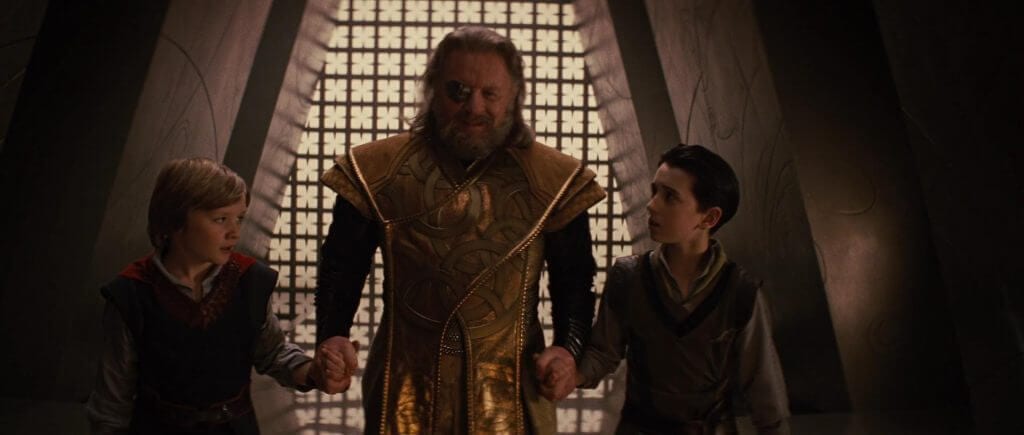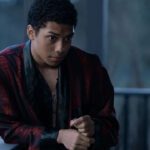“I Don’t Care; He Killed My Mom”
With each film, Phase 3 of the Marvel Cinematic Universe has been building steadily to Avengers: Infinity War. Starting with the fracturing of the Avengers in Captain America: Civil War, the newer movies have seen old heroes fall and new heroes rise, with the stakes getting higher as more powerful villains have paved the way for the ultimate evil in Thanos. Among the threads running through this phase is the recurring theme of parental loss; in each of the movies one of the main characters either suffers the death of, or rejects, a parent – be they biological or surrogate – or learns a greater truth from a parent or parents already gone.
*Spoilers for the Marvel Cinematic Universe through Black Panther*
Captain America: Civil War

Tony Stark begins Civil War with regret, and while the main source is losing Pepper Potts (as well as regret for those who have died due to his negligence), it manifests in his first scene as regret at never being able to say goodbye to his parents, to make sure they knew he loved them before they left for the trip from which they’d never return. After coming to terms with his father’s general absence and aloofness in Iron Man 2, he now wishes he’d seen that side of his dad earlier and could have told him “I know you did the best you could” in person. It’s something he’ll never be able to rectify, and that hurt is what pushes him to try to mend things with Pepper through the Sokovia Accords, to hold onto the one person he loves as much as he loved his parents. Tony will sign away the freedom he once stood up to Congress to protect so he doesn’t have to feel that loss again.
By the end, Tony comes to see the error of the Accords and that Cap was right – about Bucky’s innocence and about the Avengers being better off as an independent group (“Sam, I was wrong.”) – but while his attempts to keep Pepper in his life are a shambles, he does get a second chance to make things right with his parents when he learns Bucky was their killer. His determination to end the Winter Soldier once and for all is about more than just revenge; it’s about doing one last thing for his mom and dad, a gesture of love in an act of hate. Ultimately, Tony fails and watches helplessly as his parents’ murderer is taken to safety by his former friend; in addition to losing Pepper, now he’ll never be able to make peace with his folks. Civil War leaves Tony Stark a broken man with no one to love and no one to love him. (That Spider-Man: Homecoming negates this is absolutely criminal; I like that movie a lot, but I despise the Pepper scene.)
Doctor Strange

For Stephen Strange, it isn’t an actual parent but a parental figure that he loses. The Ancient One becomes a sort of mother to him, guiding him in the next stage of his life: the transition from neurosurgeon to Sorcerer Supreme, a man of science and rationality becoming a practitioner of mysticism. She’s been watching him his whole life (effectively, via her ability to see through time) and understands his “capacity for goodness” and his “fear of failure.” In showing him a world he’d never imagined could exist, teaching him how to not only navigate but master that world, and helping him be the man he was destined to be, has she not earned the right to call him her son?
It’s not just Strange she counts as her child, but all of her pupils, chief among them Mordo. These two represent the major child archetypes: Mordo the straight arrow who obeys unquestioningly, and Strange the rebel, always questioning, always seeking his own way. In a traditional family, Mordo would be the honor student who never got in trouble while Strange would be a truant getting grounded on a seemingly weekly basis. But Doctor Strange shows the pitfalls of always coloring in the lines, because Mordo has put the Ancient One on a godlike pedestal, revering her as something more than she could ever be – as an adoring child is wont to do – whereas Strange’s doubt puts her in a more reasonable, human light. When she falls from grace, when she shows her own fallibility in her drawing on the dark magic forbidden to her pupils, it’s Strange who is able not only to forgive her but to understand her (“But as you well know, sometimes we have to break the rules in order to serve the greater good.”); Mordo, conversely, turns his back on her and her whole philosophy, descending into the darkness from which she tried – and failed – to protect him. (While she’s dying, it’s Strange who holds her hand on the astral plane like a son saying goodbye to his mother, while the bitter Mordo is nowhere to be found.) While one son rises to greatness in her death, the other falls to evil.
Guardians of the Galaxy Vol. 2

The first Guardians of the Galaxy had Peter Quill coming to terms with the loss of his mother Meredith when he was a child, and Vol. 2 dredges up all that pain by introducing him to his father, Ego the Living Planet. Till their first meeting, Peter was happy with the other Guardians, but seeing Ego makes him long for the family he never had, the one he idealized by imagining his father was David Hasselhoff. On Ego’s planet – an extension of Ego himself, making it literally Peter’s hometown – Peter learns about his family history, talks music and even plays catch with the father he never knew, while Ego slowly tries to coax his son into, effectively, joining the family business by accepting godhood. The Quill family reunion couldn’t be more perfect.
So, of course, it’s a lie. Ego sees Peter only as a means to consume every planet in the universe, and has been manipulating his child into serving that purpose his whole life, to the extent that he killed Peter’s mother to sever his boy’s ties to humanity. This is the catalyst that snaps Peter out of his delusion and pushes him to reject Ego and the one remnant of him Peter bears (besides DNA): his godlike powers. Unlike Tony Stark, Peter is able to honor his mother by killing (or helping to kill) her murderer. In death, Meredith Quill saved her son’s soul; it just took about twenty-five years.
But it isn’t that simple, because there is another parent in Peter Quill’s life, and as with Stephen Strange, this one isn’t a blood relative. Yondu, the space pirate who abducted Peter all those years ago, is painted in quite a different light than he was in the first movie. He’s the one who kept Peter from his father, but it’s because he knew the monster Ego truly was and wanted to protect the child he’d already wronged. In the intervening years, he taught Peter how to survive, how to defend himself, how to stand tall on his own. If his mother gave him the will to fight Ego, then Yondu gave Peter the means; or, as the man himself puts it: “He may have been your father, boy, but he wasn’t your daddy.” And just as Peter realizes what Yondu truly is to him, he loses his real dad to a final gesture of love and sacrifice. While Ego’s gift was fleeting and let him down when he needed it, Peter Quill will remember Yondu’s forever.
Spider-Man: Homecoming

The MCU is choosing to severely downplay Uncle Ben in Spider-Man’s story (though he does exist, despite what detractors say; to what incident, exactly, do they think “When you can do the things that I can but you don’t, and then the bad things happen, they happen because of you” is referring?), but he does have a father figure in Homecoming; unfortunately for him, it’s self-proclaimed “piping hot mess” Tony Stark. Tony is mentoring Peter Parker into becoming an Avenger – ostensibly, anyway. In practice, he’s just ignoring the star-struck kid till he needs someone who can do whatever a spider can. Even when he intervenes to rescue Spidey from the Vulture, he’s not really present; he sends one of his AI-controlled suits (Tony really doesn’t learn, does he?) to do his parenting while he parties in India. The special features he programmed into the Spider-Man costume are all things that hamper Peter’s performance as Spider-Man instead of helping him. Peter, of course, feels ignored by his surrogate father, more a nuisance than a fellow traveler on the path of the hero. When Peter, excited to finally be helping his idol, informs Tony of the weapons deal on the Staten Island Ferry, Tony arranges for the FBI to arrest all involved but doesn’t tell Peter about it till after the fact, leading to eager-to-impress Peter botching the sting. (It’s telling that, unlike in their first encounter, the real Iron Man shows up this time, present to point out his ward’s shortcomings but not to reassure him.) It’s only in getting away from Tony and his tech that Peter is able to be the Spider-Man we all need him to be, and in the end he, like Peter Quill, rejects the father enticing him with augmented power (only with less killing) to be a more pared-down, but more effective, hero.
There’s another father in Homecoming, and he isn’t Peter’s; Adrian Toomes, the film’s villain, is revealed to be the dad of Peter’s crush Liz, putting Peter in the position of either allowing evil to flourish or destroying the life of the girl he likes. He chooses the latter and, in between being rejected by, and rejecting in turn, his own father figure, he takes Liz’s dad away from her. (I’m so sick of hearing there are no consequences to Peter’s actions in this movie; his tearing apart Liz’s family and having to live with the guilt that ensues forever is much more powerful than him missing Mary Jane’s lousy looking play in Spider-Man 2.) Peter and Liz are both forced to grow up by seeing their fathers for the men they truly are and, while not ceasing to love them, understanding that they’re better off away from them; while Peter clearly learns this lesson, whether Liz does is up in the air.
Thor: Ragnarok

Once more we have a literal parental death in the passing of Odin. While this happens early on, Thor spends the rest of the movie dealing with the repercussions not only of his father’s death, but of his life. Odin shielded Thor and Loki from certain harsh truths, much like the Ancient One did to Doctor Strange and Mordo, but Odin’s are much darker: he used his sons’ heretofore unmentioned older sister to wage bloody wars and conquer the other realms, then locked her away as his thank-you. Thor now must come to terms with his father’s imperfections and clean up the mess Odin made, becoming a better leader through losing his remaining parent. At the same time, he learns from Odin and even repeats some of his dad’s tactics, such as letting loose a monster to do his fighting for him.
Where Ragnarok drops the ball spectacularly (among many other places; this may be my least favorite movie in the MCU) is in its treatment of Loki. The God of Mischief’s reaction to his father’s death should’ve been at least as complicated as Thor’s, if not more. Loki has always been at war with his own feelings towards Odin; he rages at his adopted father and wishes to steal his throne, yet the impetus for much of his evil is his desire for his dad’s approval. Now Odin is dead, and because of Loki. What might this do to him? We don’t know because Taika Waititi couldn’t figure out how to turn it into a joke. So, instead of the complex and fascinating Loki we’ve come to love over the years wrestling with his feelings of guilt, satisfaction, anger and bloodlust, we see a buffoon getting electrocuted for another slapstick gag. (This movie couldn’t even get the obedience disks from Planet Hulk right!) Thor: Ragnrok’s greatest sin might be making us lament what could’ve been, in part between Loki and the father he lost by his own hand.
Black Panther

Now, here’s a movie that does it right. Black Panther’s father/son dynamic is strikingly similar to the one in Ragnarok, but it’s executed infinitely better. Like Odin, T’Chaka is a revered ruler of his home land whose oldest son is a noble warrior slotted to take his place as king. And, as Thor did, T’Challa learns some harsh truths about his father, truths that shatter the idealized image the son once had. T’Chaka abandoned an innocent child to the cruelties of the world, leaving young Erik to grieve for his own father without so much as an explanation as to why his dad had to die; and, again like Odin, he created a monster determined to claim his lost home as his birthright. Now T’Challa has to fight the war his father brought on Wakanda, as well as strive to be a better leader, exporting Wakanda’s wealth and resources to stop more Killmongers from being made every day.
But is Killmonger’s fate entirely T’Chaka’s fault? A big part of it, sure, but his own father N’Jobu bears some of the responsibility as well. N’Jobu was a criminal who brought his son along as he sold weapons – or, at least, the means to make them – to arms dealers. He was also killed while trying to murder Zuri, another Wakandan. N’Jobu wouldn’t have been the best role model for his son even if he had lived, but in forcing T’Chaka to kill him, he set in motion the cycle that ended with Erik Stevens becoming Killmonger and, ultimately, dying at the hands of the next Black Panther just like his dad. Hero and villain both have a father who failed them; what separates them is how they respond to that failure.
***
It isn’t hard to imagine how this theme will manifest in Infinity War. Thanos’ relationship with his two daughters, Gamora and Nebula, has shown up in both Guardians movies and will almost certainly be explored further when the Mad Titan comes to the fore. Meanwhile, both Tony Stark and his parents’ killer will be fighting on the same side, Spider-Man will once again align himself with the mentor he outgrew, Doctor Strange will be fulfilling the role for which the Ancient One groomed him, and Thor and Black Panther will likely have the lessons of their fathers running through their heads as they make their stands against the coming darkness. How it all plays out is anyone’s guess, but whatever happens, I’m confident Marvel will leave us satisfied.







